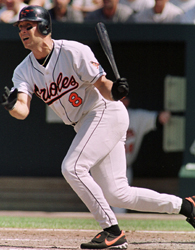Cal Ripken, Jr. revolutionized the shortstop position while playing in a record 2,632 consecutive games, all for the Baltimore Orioles. His record-breaking 2,130th straight game is remembered as one of baseball’s greatest moments and credited with helping save the sport.
Cal Ripken’s Early Days
Calvin Edwin Ripken Jr. was born on August 24, 1960, in Havre de Grace, Maryland. His father, Cal Sr., was a career minor leaguer who in 1972, became the coach of the Orioles’ AA affiliate in North Carolina. Cal Jr. and his siblings grew up around the team, with 12-year-old Junior working as a bat boy and shagging fly balls during batting practice.
Cal Sr. became famous for instilling solid fundamentals in players, teaching them “The Oriole Way.” He became an Orioles coach in 1976 and moved the family to Aberdeen, Maryland, where Cal Jr. excelled on the Aberdeen High School team. In 1978, the Orioles chose him fourth overall in the major league draft.
Cal worked his way up through the Orioles’ minor league system. In 1981, while playing for the Orioles’ AAA affiliate, the Rochester Red Wings, Ripken took part in the longest game in professional baseball history. On a cold Easter Saturday, the Red Wings and Pawtucket Red Sox played 32 innings before the game was called at 4:07 a.m. and completed months later. “A lot of us,” Ripken quipped, “had a bad week that day.”
Ripken would not have many more bad weeks for Rochester; on August 10 of that year, he was called up to Baltimore, marking the beginning of a 21-year career.
Sources in this Story
- Time: Iron Bird
- The Washington Post: A Great Teacher of the Game
- The Washington Post: Long Memories From a Baseball Classic
- The Baltimore Sun: Weaver’s vision starts it all
- The Baltimore Sun: Kid brings glory to vets
- Sports Illustrated: One Rip-roaring Family Affair
- Sports Illustrated: Rip on a Tear
- The New York Times: Baseball Needs Ripken to Take A Day Off
- MLB.com: Major League Baseball Most Memorable Moments
- The Washington Post: Ripken’s Quiet Approach Helped Revive the Game
- The New York Times: Oriole Officials Yielded To Cal Ripken’s Streak
- USA Today: Ripken leads AL to fifth straight victory
- Baseball Hall of Fame: Cal Ripken
Ripken’s Baseball Career
Ripken played 23 games in 1981, and began 1982 with the Orioles. Playing in all but three games, he won AL Rookie of the Year. A year later, he won the American League MVP award and led a veteran team to the World Series, where they beat the Phillies in five games. It would be Ripken’s only World Series win.
Ripken continued to put up solid numbers and play in every game, but the Orioles struggled to regain the success they had in the late ‘70s and early ‘80s. In 1987, Cal Sr. was promoted to manager and his younger son Billy Ripken was also called to the Orioles. It was the first, and thus far, the only time that a father managed two sons on a major league team.
Orioles continued to struggle over the next several years and Ripken’s average dropped into the mid-.200s, some in the media began calling for Ripken to rest. Ripken responded with a career year in 1991, hitting .323 with 34 homers and 114 RBI, and winning his second MVP.
In 1995, following a strike-shortened 1994 season, Ripken was on pace to break Lou Gehrig’s 56-year-old consecutive games streak in September. A New York Times columnist famously suggested that Ripken take off a day so he wouldn’t break Gehrig’s record.
Ripken did not take a day off, and was in the lineup on September 6 to play his 2,131st consecutive game. After the top of the fifth inning, when the game became official, the game stopped and the crowd gave Ripken a standing ovation for 22 minutes, 15 seconds, as he took a lap around the field. He would homer later in the game, capping one of the greatest moments in baseball history.
Many credit it with helping to save baseball after the 1994 strike. “Ripken proved baseball still could provide riveting moments,” wrote Richard Justice three years later. “Many in baseball haven’t forgotten that the rebirth began with Ripken taking an emotional, joyous victory lap.”
Ripken would play another three years at shortstop and third base without taking a day off. Some in the media criticized him for putting the streak above the good of the team and for having more power than his managers. On September 20, 1998, Ripken pulled himself out of the lineup, ending the streak at 2,632 games.
In 2001, Ripken announced that he would retire after the season. In his final all-star game, he homered and won game MVP.
The Rest of the Story
After retiring, Ripken dedicated himself to youth baseball, holding baseball camps and making instructional videos with his brother Billy. He also helps run the Cal Ripken, Sr. Foundation, which teaches “The Ripken Way” to disadvantaged youths.
He bought a minor league baseball team and moved back to his hometown of Aberdeen. The Aberdeen IronBirds play in Ripken Stadium, a state-of-the-art, 6,000-seat stadium.
In 2007, Ripken was elected to the Hall of Fame. His Hall of Fame page celebrates Ripken with video of his career, streak-breaking game and induction speech.
This article was originally written by Denis Cummings; it was updated August 18, 2017.











